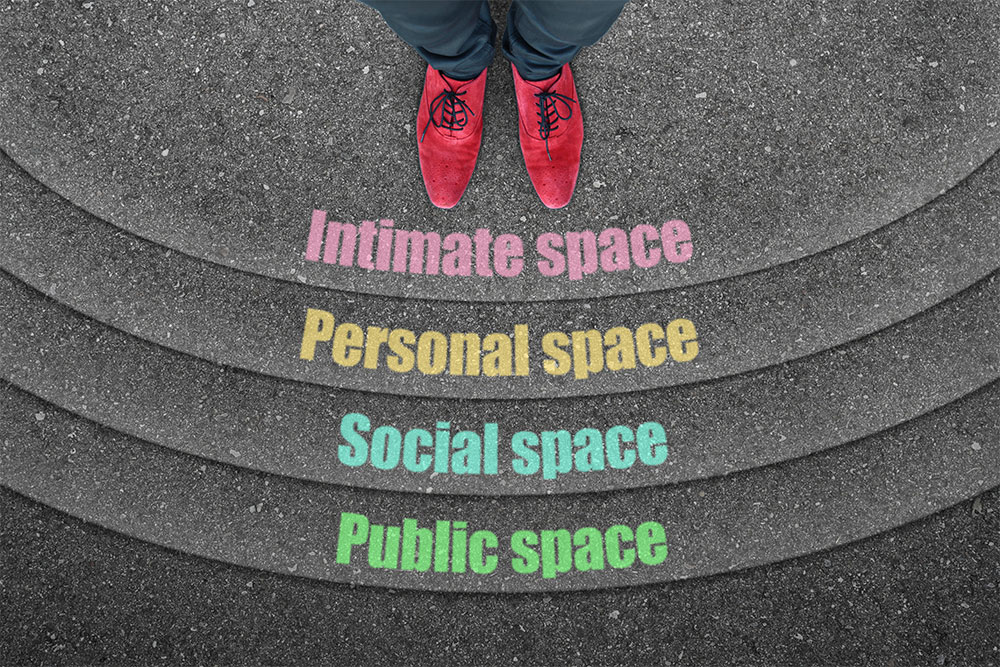Do you often find yourself working more than your share, at work? Do you mostly find yourself unable to say “no” because you want everyone’s approval? Does this lead you to space where you’re mostly overworked at the cost of your mental peace and happiness? If your answer is “yes” to the above questions, then it may be a sign that you lack boundaries.
What are boundaries, you ask? Well, boundaries are anything which help you set certain markers for yourself. In our daily lives, they act like an invisible line which limits “too much” of any activity, be it in our personal or professional spheres.
Overall, there are two types of boundaries:
i. Healthy boundaries: This is characterised by setting clear cut markers and conveying to others what is okay with you and what is not. It boosts self-respect, self-reliance, and self-esteem because you know the other person cannot take undue advantage of you.
ii. Unhealthy boundaries: This is characterised by a weak sense of self. You often feel you’re not good enough for the situation you’re in, and find it easier to rely on external factors for happiness. Your decisions are mostly based on what the other person requires of you, thus making you struggle with your own identity.
Let’s have a look at how boundaries play a vital role in our personal and professional lives.
Personal Life
Personal boundaries are crucial to mental peace and leading a life which is dictated by your own terms. Ms Mehezabin Dordi, clinical psychologist, rehabilitation, and sports medicine department, Sir HN Reliance Foundation Hospital, Mumbai elaborates, “Setting certain personal boundaries is essential to creating and maintaining healthy relationships, both with others and oneself. It is also said to boost self-esteem while reducing anxiety, stress, and depression. When you set clear boundaries, you make your intentions known so others are aware of what works and what doesn’t for you.”
We illustrate different types of boundaries for one’s personal life:
1. Physical Boundaries
This implies the immediate area around you. It includes your personal space, comfort with touch, and other physical needs. “Notice if the personal contact is getting too close for comfort and violating your personal space. Clearly conveying what is allowed in your physical space can help you and others maintain this boundary,” says Dordi.

2. Emotional Boundaries
This refers to our emotional and internal experiences, which also includes acknowledging our feelings. “It so happens that you’ll find easy support when things are going well. However, when you’re feeling anxious or down, it can be complicated because the other person may have a hard time understanding how you feel, leaving you with negative feelings or being misunderstood,” shares Dordi. If you also find yourself becoming a therapist to a friend who is overwhelmed by their own emotions or experiences, it would be a good time to take a step back and assess your boundaries.
3. Mental Boundaries
Your thought process makes up your mental boundaries. It involves what you think about yourself and the world. Since it’s not possible to agree with everyone all the time, it’s important to remember that each person has the right to their thoughts, opinions and beliefs. “You should be able to give and receive respect when sharing your thoughts, and if you are met with aggression or hostility, it’s best to remove yourself from the situation,” advises Dordi.
4. Time And Energy Boundaries
Time and energy are two resources, which once lost, are difficult to get back. Says Dordi, “With a rise in the FOMO culture, where missing out on something means you’ve lost out on a significant life experience, you may just end up participating in unnecessary activities when instead you could have done something for yourself in that time. When you’re constantly working around your schedule, it can greatly stress you out and impact your mental and physical wellness.”

5. Material Boundaries
These boundaries consist of your personal possessions and how you treat your belongings. “If you don’t like your things being touched or used without permission, it’s a clear violation of your boundaries and you should convey the same to the other person. If your belongings are stolen or damaged, that would count as a severe violation,” Dordi elaborates.
6. Sexual Boundaries
Consent, respect, and understanding preferences make up sexual boundaries. Dordi goes on to explain, “Healthy sexual boundaries involve asking for permission, having an open discussion about what both you and your partner like, using protection or contraception. If you’re uncomfortable with something, you should be able to say no.”
Professional Life
Just like your personal life, boundaries play an equally important role when it comes to your professional life. Bhagyashree Pandey, assistant HR manager and corporate communications, Grand Slam Fitness Private Limited, says, “Boundaries are extremely important when working in a common space/building with so many people around. There ought to be some boundaries to make everyone feel safe and comfortable. In an organisation, you can find all these rules and boundary guidelines written down in a manual/handbook given to you during your induction into a company.” However, some professional boundaries may be created by people to safeguard their personal space in a professional setup.
She lists down some types of boundaries that should be maintained at the workplace:
1. Personal Boundaries
This includes maintaining a personal space, and letting the other person know when you’re uneasy. “You cannot be barging into someone's private space and expect them to be welcoming. You need to be mindful when the other person has started to feel uncomfortable with the way he/she has been approached,” Pandey adds.
2. Mental Boundaries
Granted, there will be work pressure of different kinds when you’re in a professional environment. However, that should not be an excuse to weigh down heavily or lash out on another person. Pandey says, “You cannot publically reprimand someone in your place of business and expect them to be okay with it. If you feel some sort of hostility, it’s always better to excuse yourself from the situation, and approach the HR if things get out of hand.”

3. Work Boundaries
Oftentimes, you may find yourself doing more work than anticipated. However, you need to take stock if this becomes too frequent. “Overworking yourself, especially when it’s not part of the job description, can cause a lot of stress, which could further hamper your work. In such times, reach out to your manager and discuss the scope of work and how to divide it under different timelines. You should also let them know if the work is something you’re not equipped to do,” explains Pandey. She further elucidates that if there is any escalation in sharing your issue, having a conversation with the HR involved can help with effective communication.
4. Physical Boundaries
The space around you, like your cubicle, office, and wherever you sit or stand signifies your physical boundaries. So when someone forces their way into this space intentionally or unintentionally, it is a violation of your physical boundaries. This also includes any explicit action, use of lewd language, or sending inappropriate messages. “Sexual harassment in the workplace is unfortunately, not unheard of, and has severe consequences, such as immediate termination, blacklisting the accused from other companies, and in extreme cases, the person being jailed. We encourage our employees to report any misbehaviour in the first instance so strict action can be taken,” shares Pandey.

Now that you know about the different types of boundaries in your personal and professional life, and how and where you should draw a line, it doesn’t hurt to be assertive and ask for your space if you ever feel uncomfortable. Having boundaries is extremely healthy and nothing to feel guilty about.